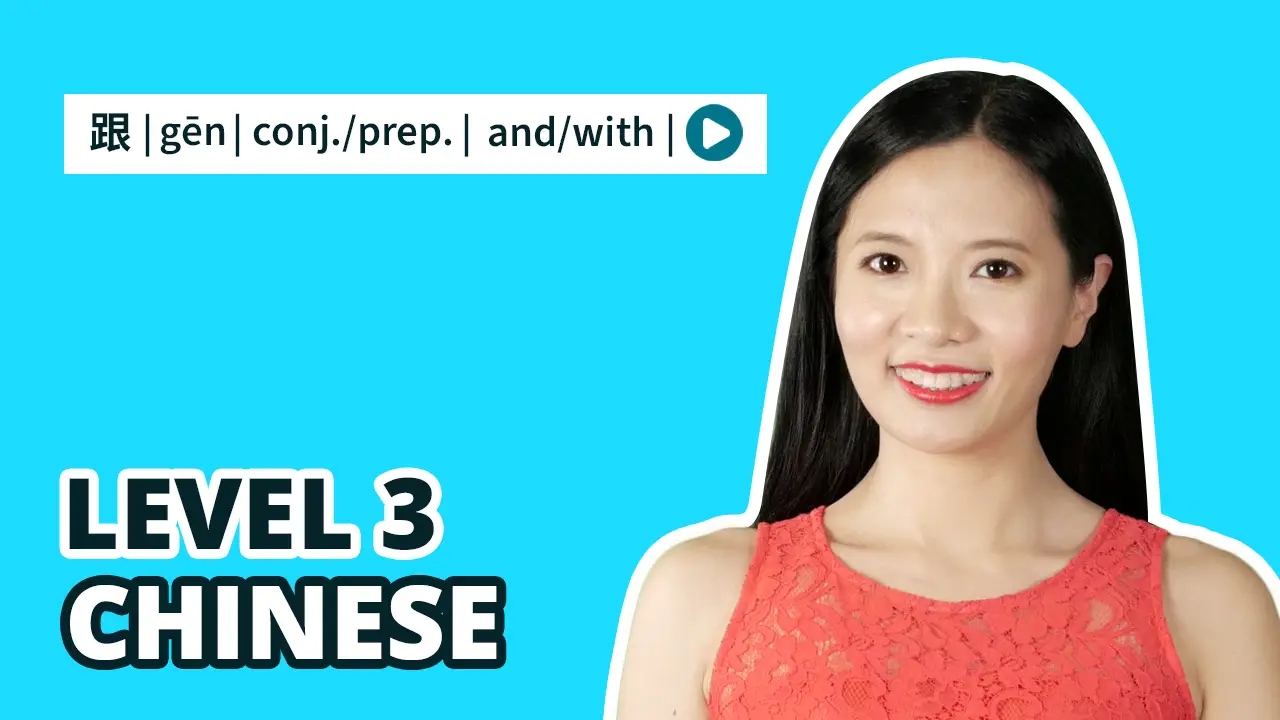Level 3 Lesson 5.2 – 我昨天晚上没有睡着。
GRAMMAR: 1. 结果补语 "到"; 2. 结果补语 "好"; 3. 一些别的结果补语 Complements of Result
In this HSK 3 video lesson we'll learn about 结果补语 Complements of Result. We'll practice how to use 结果补语 "好", 结果补语"到" and some other 结果补语.
- 结果补语"到"
- 结果补语 "好"
- Some other 结果补语
GRAMMAR
Grammar 1. 结果补语 "到"
Jiéguǒ Bǔyǔ "dào" ▸ Complement of Result "到"
See also 结果补语(Jiéguǒ Bǔyǔ "dào" ▸ Complements of Result).
- a 结果补语 goes after a verb
- all 结果补语 generally indicate the meaning of "reaching a result"
- different words can be used as 结果补语
- different 结果补语 indicate separate meanings on top of the basic meaning of "reaching a result"
“到” can be used as a 结果补语 (Jiéguǒ Bǔyǔ "dào" ▸ Complements of Result) after a verb to indicate:
- 动作已经做了 the action has been completed
- 这个动作有一个结果 the intended result is successfully achieved, because this action is performed
For example,
- Xīnglixiāng nádào le ma? 行李箱拿到了吗? (The) luggage (has been) fetched (with the intended result successfully achieved) already?
- Nǐ zhǎodào hùzhào le ma? 你找到护照了吗? Have you found the passport already?
- Chènshān de jiàgé yǐjīng wèndào le. 衬衫的价格已经问到了。 The price of the shirt has been asked (with the result of achieving the intention of getting an answer).
Grammar 2. 结果补语 "好"
Jiéguǒ Bǔyǔ "hǎo" ▸ Complement of Result "好"
"好" can be used as the 结果补语 (Jiéguǒ Bǔyǔ ▸ Complement of Result) after a verb to indicate:
- the action is complete and the result is satisfactory
- (usually) since this action is done and done well, it’s ready for the next action or event
For example,
- Wǒ zuótiān wǎnshang méiyǒu xiūxihǎo. 我昨天晚上没有休息好。 I did not rest well last night. ☉ with the intended result successfully and satisfactorily achieved
- Wǒ yǐjīng zhǔnbèihǎo jiǔyuè qù kǎo HSK le. 我已经准备好九月去考HSK了。 I have already prepared well (and am ready) to go take the HSK test in September. ☉ with the intended result successfully, satisfactorily achieved and ready for the next action
- Shuǐguǒ xǐhǎo le, kuài qǐng kèrén chī ba! 水果洗好了,快请客人吃吧! The fruit has been washed (with a satisfactory intended result and is ready), hurry up and offer it to the guests to eat!
Grammar 3. 别的结果补语
Bié De Jiéguǒ Bǔyǔ ▸ Other Complements of Result
(1) 结果补语 "上"(shàng ▸achieving a result)
- Wǒ kǎoshàng le zhèlǐ zuì hǎo de Hànyǔ xuéxiào. 我考上了这里最好的汉语学校。 I took a test (with the result of getting in) the best Chinese school here.
- Xǐshǒujiān de mén zěnme méi guānshàng? 洗手间的门怎么没关上? How come the restroom door has not been closed (with the intended result achieved)?
- Tā dàishàng le yì dǐng màozi. 他戴上了一顶帽子。 He put on a hat/beanie (with the intended result achieved).
- Nǐ chuānshàng xiézi le méi? 你穿上鞋子了没? Have you put on the shoes (with the intended result achieved)?
(2) 结果补语 "懂" (dǒng▸achieving the result of understanding)
Lǎoshī shàngkè shuō de nǐ tīngdǒng le méiyǒu? 老师上课说的你听懂了没有? Did you understand what the teacher said in class or not?
(3) 结果补语 "着" (zháo▸achieving a result)
Wǒ zuótiān wǎnshang méiyǒu shuìzháo. 我昨天晚上没有睡着。 I did not fall asleep last night.
(4) 结果补语 "胖" (pàng ▸ achieving the result of being fat)
Wǒ yòu zhǎngpàng le. 我又长胖了。 I have gained weight again(already). / I have “managed to” gain weight again.
(5) 结果补语 "完" (wán▸ achieving the result of finishing)
- Wǒ huàwán shì huàwán le, kě huà de bù hǎokàn. 我画完是画完了,可画得不好看。 Given that I finished drawing, I still did not draw it nicely.
- Nà tào shū shì qùnián xiěwán de. 那套书是去年写完的。 That series of books was finished last year.
- Zǒuwán zhè tiáo lù wǎng yòu zài zǒu wǔ gōnglǐ. 走完这条路往右再走五公里。 After finishing walking this road, go right and walk another five kilometers.
(6) 结果补语 "清楚" (qīngchu▸ achieving the result of being clear)
- Kāichē de shíhou yào kànqīngchu qiánmiàn. 开车的时候要看清楚前面。 When driving, you should look ahead clearly.
- Nǐ xiǎngqīngchu le méiyǒu? Yàobuyào gēn tā fēnshǒu? 你想清楚了没有?要不要跟他分手? Have you thought it through or not? Do you want to break up with him?
- Wǒ xiǎng gēn nǐ shuō qīngchu, zhè bú shì wǒ de cuò. 我想跟你说清楚,这不是我的错。 I want to explain it clearly to you, this is not my fault.
(7) 结果补语 "对" (duì▸ achieving the result of being correct or right)
- Nǐ shuō duì le, zhèr zhēnde méiyǒu xǐshǒujiān. 你说对了,这儿真的没有洗手间。 You were right, there really is no bathroom here.
- Nǐ zhǎoduì dìfang le, zhèr búdàn piányi, érqiě hǎochī. 你找对地方了,这儿不但便宜,而且好吃。 You found the right place, it is not only cheap but also tasty.
- Zhè jiàn shì nǐ zuòduì le, dàjiā dōu hěn gāoxìng. 这件事你做对了,大家都很高兴。 You did this right, everyone is happy.
(8) 结果补语 "错" (cuò▸ achieving the result of being incorrect or wrong)
- Zhè dào tí wǒ zuò duì le, tā zuò cuò le. 这道题我做对了,他做错了。 I got this question right, he got it wrong.
- Zhè jiàn shì nǐ zhēnde zuòcuò le, dàjiā dōu bù gāoxìng le. 这件事你真的做错了,大家都不高兴了。 You really did this wrong, everyone is unhappy.
- Duìbuqǐ, wǒ méi dài yǎnjìng, kàncuò le, nà ge bú shì wǒ yéye. 对不起,我没戴眼镜,看错了,那个不是我爷爷。 Sorry, I did not wear glasses and I saw it wrong, that is not my grandpa.
- Wǒ nácuò le xínglixiāng, zhè ge shì biérén de. 我拿错了行李箱,这个是别人的。 I took the wrong suitcase, this one belongs to someone else.
- Zhè tiáo kùzi de jiàgé xiěcuò le ba? 这条裤子的价格写错了吧? The price of these pants was written wrong, right?
- Duìbuqǐ, wǒ xiǎngcuò le, zhè zhǒng màozi bú shì tā yǎo de. 对不起,我想错了,这种帽子不是他要的。 Sorry, I thought it wrong, this kind of hat/beanie is not what he wants.
